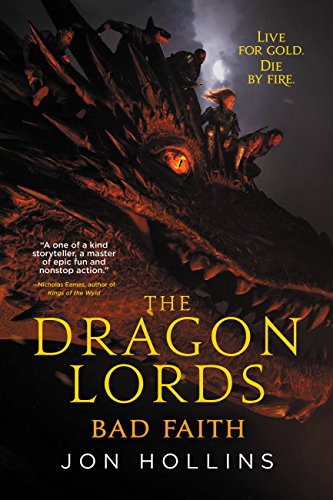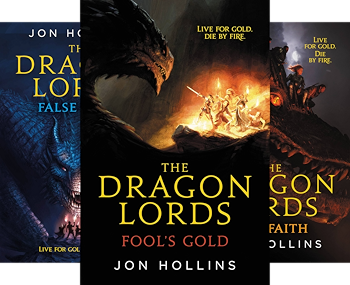
![]() The Dragon Lords: Bad Faith by Jon Hollins
The Dragon Lords: Bad Faith by Jon Hollins
Bad Faith (2018) concludes the DRAGON LORDS trilogy Jon Hollins began with Fool’s Gold, a rollicking heist story that more than earned its comparisons to The Guardians of the Galaxy and The Hobbit. The trilogy’s second volume, False Idols, answered some lingering questions I’d had, but also took the series down a darker and more meandering path. Bad Faith continues that darker and carelessly blood-drenched tone while questioning whether gods and religion really do all that much good for anyone, in the long run.
Warning: There will be inevitable spoilers for False Idols, in particular, so it will be best to read that book before proceeding.
When last we saw them in False Idols, Will and many of his compatriots, along with most of Avarra’s gods, had just been killed and flung into Avarra’s afterlife, the Hallows. Existence in the Hallows is messy, unhappy, and risky — death there means actual death, with one’s essence loosed into the Void, never to be re-incorporated. However, Will learns that there were once other gods, the Deep Ones, who contained magic the likes of which could help him return to the mortal realm and fight the sole surviving god, Barph, on something closer to equal terms. (That Lovecraftian power, and its gradual transformation of Will’s mind and body, are easily the creepiest and most viscerally effective aspects of Bad Faith.)
 So, armed with a minor pinch of godhood that grows stronger and more dangerous as he gathers followers who believe in him, Will punches a hole between the realms and drags his friends out of the Hallows — a hole he can’t close, and which not only corrupts the land it touches, but allows passage for other creatures from the Hallows into Avarra. Will intends to close the portal on the few times he remembers it, he really does, but he just doesn’t ever seem to have the right amount of power to do it, and either the timing isn’t right or he just can’t be arsed enough, and besides, the plot wouldn’t have nearly as dramatic a conclusion if Will did the sensible thing when it sensibly needs to be done.
So, armed with a minor pinch of godhood that grows stronger and more dangerous as he gathers followers who believe in him, Will punches a hole between the realms and drags his friends out of the Hallows — a hole he can’t close, and which not only corrupts the land it touches, but allows passage for other creatures from the Hallows into Avarra. Will intends to close the portal on the few times he remembers it, he really does, but he just doesn’t ever seem to have the right amount of power to do it, and either the timing isn’t right or he just can’t be arsed enough, and besides, the plot wouldn’t have nearly as dramatic a conclusion if Will did the sensible thing when it sensibly needs to be done.
Will’s single-minded pursuit of Avarra’s freedom from Barph takes over everything: his POV takes precedence over the people he once called his friends, so counter-point chapters tend to show Lette or Balur reacting to Will’s increasing separation from reality and wringing their hands without expressing their own agency. The group dynamic that made Fool’s Gold so strong has fallen completely to pieces by Bad Faith, but rather than seeming like an inevitable consequence of Will’s continuing obsession with Barph and his hunger for power, it feels as though overall character involvement fell to the wayside. Will’s mission to stop Barph’s wanton destruction and slaughter repeatedly results in the destruction and slaughter of both Will’s followers and Barph’s, and I expected there to eventually be some kind of reckoning that Will would ultimately have to face for his hubris, but the end result was hugely disappointing. Hollins doesn’t go as far as “it was all just a bad dream,” but it’s a pretty near thing.
Slimmer than its preceding volume, Bad Faith initially benefits from the shorter page-count by keeping its plot more tightly-focused on its core group of adventurers, with occasional glimpses into the continuing exploits of the drunken god Barph. But Lette and Balur, who have such strong and interesting voices at first, gradually quiet, particularly with regard to Lette; while they grow to dislike how far Will is willing to take his crusade and how much he’s willing to sacrifice in his own name, there’s very little they do or say against him. Hollins definitely seems to have lost his footing with Quirk, originally a complex and curious woman, but now whose single-minded and ruthless pursuit of vengeance is rivaled only by Will’s, and for reasons that rely on a depth of emotional attachment to Afrit that are touched on lightly, but require more exploration than is afforded throughout Quirk’s character arc in THE DRAGON LORDS.
The overthrown gods are generally pathetic figures, other than the “hermaphroditic god(dess) of love and lust,” Cois, who finds a measure of peace and contentment alongside Balur. Barph is too much of a caricature and doesn’t engage in self-reflection long enough to be sympathetic, and Will becomes so awful in the attempt to stop him that it was never clear whether the people of Avarra were going to be better off by switching one subject of their belief for another. Worst of all, the dragons, themselves, function as little more than plot devices and cannon fodder despite all of the bombast and pomp they’re given by those crunchy humans. Initially fascinating glimpses at dragon society on their island stronghold don’t develop beyond surface details and basic character sketches — they’re universally greedy and bitter, and quick to betray any alliances for temporary gain, but I couldn’t tell you even a ballpark number for how many dragons there are, which seems like an important figure to know, if only when tallying forces that have rallied against Barph or are fixed in place across a battlefield.
For a series that started out so promisingly, THE DRAGON LORDS limps to an end that feels forced and unnecessary, with the overall impression that Fool’s Gold is an excellent stand-alone while False Idols and Bad Faith are unfocused and muddled hangers-on. It’s not just that the series quickly stopped being fun, but that its increasing grimness and body-count just weren’t interesting or consequential. I still highly recommend Fool’s Gold, but my future re-reads will end with that volume.



Leaving the rift open reminds me of the characters in Philip Pullman’S HIS DARK MATERIALS… Only his characters did close the portal.
I hadn’t thought of that, but you’re right. (And now I want to go re-read that entire trilogy, haha.)